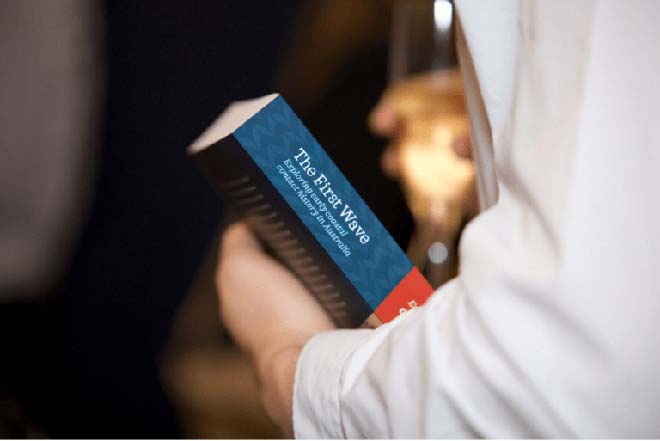New perspectives of first contact in Australia

To examine first contact in Australia from a different perspective, Flinders University academics Dr Gillian Dooley and Dr Danielle Clode have edited a new book that presents an alternative view of early coastal contact history in Australia.
The First Wave draws together 26 essays, stories, and poems from a range of authors, some of Aboriginal heritage – poets, novelists, historians, literary scholars, art historians, anthropologists, musicologists, linguists, ecologists. This includes thought-provoking poetry by Yankunytjatjara Aboriginal poet Ali Cobby Eckermann, fiction by Miles Franklin award-winning Noongar author Kim Scott and an account of the arrival of Christian missionaries in the Torres Strait Islands by Torres Strait political leader George Mye.
“We wanted to include multiple perspectives on multiple encounters, in a variety of genres – concentrating on meetings with explorers – temporary visitors, rather than the settlers or invaders who came later, though it’s not so easy to draw these kinds of boundaries,” said Dooley.
The implications of re-examining such historical records resonate in countries around the world that have also been colonised. “Anyone, anywhere who’s working in the postcolonial area is interested in the issues dealt with in the book, so we shouldn’t think of it as just an Australian history book."
The impetus for The First Wave came from her reading of an account of Matthew Flinders’ official journal on the Investigator – not the popularly recognised 1814 publication Voyage to Terra Australis, but his day-by-day record of events and observations during his circumnavigation of Australia 1801-1803, recently published for the first time.
She started wondering what lay behind his observations of the Aboriginal inhabitants and his accounts of the meetings and transactions between them and the members of the expedition – officers, scientists and crew. “Mutual misunderstanding was almost universal, whether it resulted in violence or apparently friendly transactions, and there is plenty of documentation of the European point of view, but what is the other side of the story?,” Dooley said.
“This thought opened up a much bigger range of stories of other explorers around the Australian coast, so Danielle (Clode) and I put out a call to get a broad range of perspectives from both sides of the beach. Beyond academic essays, there's also poetry and fiction as well as less conventional forms of scholarly inquiry, such as photo essays and 'ficto-criticism'. Lots of disciplines are included too - history, anthropology, literary studies, musicology, art history and probably more.
“It brings to light many new stories and angles on what was an ongoing, complex and varied series of events across a couple of centuries, involving many individuals in many different places.
“Having launched the book in London and distributed copies among historians and postcolonial scholars in the UK and Europe, I'm hoping it might bring them a new awareness of the complexities of early Australian colonial encounters.”